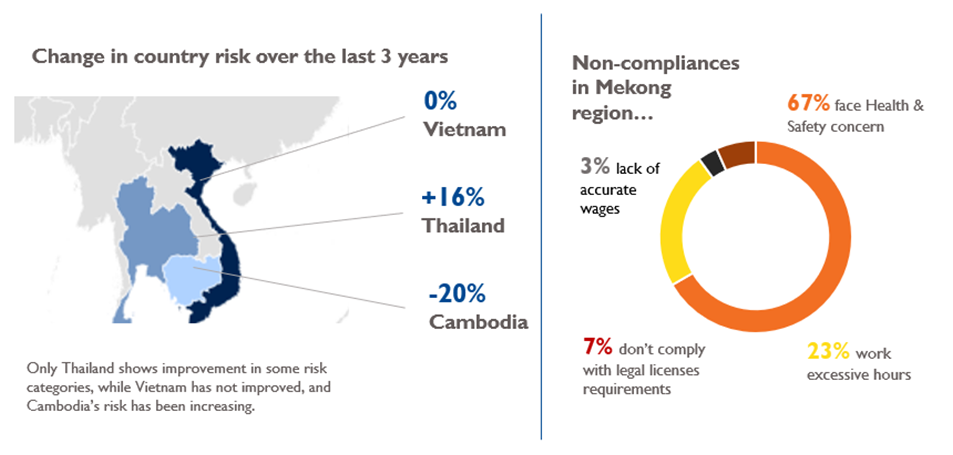The Mekong Region at a Crossroads – Transforming ESG practices in the manufacturing sector
Environmental, Social and Governance (ESG) is widely known in the corporate world as a strategy used to illustrate an organization’s due diligence and compliance with legal requirements.
In recent years, corporations and shareholders have put mounting pressure on organizations’ ESG performances, while consumers’ growing awareness surrounding the impact of certain sourcing practices on workers and the environment is also feeding into their purchasing decisions.
This increased focus on ESG considerations is recently impacting regulations for global supply chains. Several countries have passed supply chain legislation, such as the UK Modern Slavery Act and the German Supply Chain Due Diligence Law, while others have just recently increased scrutiny through Withhold Release Orders (WROs). These legislations have brought to the forefront a range of issues such as modern slavery, forced labor, environmental pollution and greenhouse gas emissions.
As the government regulations continue to rise, the importance of longer-term risk management and enhancing ESG performance becomes vital for businesses. Redesigning global supply chains through an ESG lens will not only reduce organizations’ risks and help meet their shareholder and stakeholder requirements, but ultimately help reduce costs, especially when keeping in mind longer-term financial implications of reputational damage. At the same time, enhanced ESG performance constitutes a business potential for factories and sites, as it will enable them to meet customers’ demands, retain workers and thereby become more competitive.
Factories in the Mekong are at a crossroads, facing a choice between adopting Environmental and Social Governance (ESG) best practices that will increase sustainability, or employing lower-cost but ultimately counterproductive practices that compromise natural resources, the health and safety of factory workers, and the well-being of surrounding communities.
 Data source: ELEVATE EiQ, 2021
Data source: ELEVATE EiQ, 2021
ELEVATE is proud to announce its partnership in the Mekong Sustainable Manufacturing Alliance (The Alliance), a $10 million partnership funded by the United States Agency for International Development (USAID). The Alliance addresses the critical and increasingly urgent need to transform ESG practices in the Mekong manufacturing sector to avert deleterious environmental and social impacts that will result from rapid industrial growth.
The Alliance, implemented by the Institute for Sustainable Communities (ISC) in partnership with ELEVATE, and the Asian Institute for Technology (AIT), tackles these challenges head on using a market-driven approach to advance ESG improvements.
Its goal is to strengthen sustainable and competitive manufacturing in Cambodia, Thailand, and Vietnam, engaging the private sector, catalyzing market forces, and advancing innovative country-specific and regional initiatives that will increase adoption of ESG standards by manufacturers. The program will thus improve the health, livelihoods, and well-being of vulnerable populations, foster sustainable economic growth, and advance the journey to self-reliance in the Mekong region. Focus industries of this program are the apparel, footwear, electronics and food processing sector.
As part of the Alliance, ELEVATE and our partners will develop social, environmental and governance solutions for manufacturing sites. Topics that will be addressed include reduction of carbon emission and waste management as well as protecting foreign migrant workers and building a respectful workplace.
The partners will conduct large-scale awareness trainings, provide tools, conduct demonstration projects, and support with technical assistance. After the implementation phase, best practices will be shared through case studies and webinars, to provide access to all interested parties.

To introduce the USAID funded “Mekong Sustainable Manufacturing Alliance” program to interested suppliers and manufacturing sites, ELEVATE is offering a range of introduction webinars in local language. The webinar will provide insight into the program, that ELEVATE is implementing together with the Institute of Sustainable Communities and the Asian Institute for Technology. Interested brands, retailers and factories are welcome to join to explore how they can benefit from participating in the upcoming training and on-site activities.
Click here to register to the Alliance Supplier Onboarding Webinar on the 10th of March, 2022 in English, Mandarin, Khmer, Vietnamese or Thai.
This material does not necessarily reflect the views or policies of the United States Agency for International Development, nor does mention of trade names, commercial products, or organizations imply endorsement by the United States Government.
These blogs are written by ELEVATE staff members or associates and the views and opinions expressed are not necessarily those of ELEVATE.
About the author
